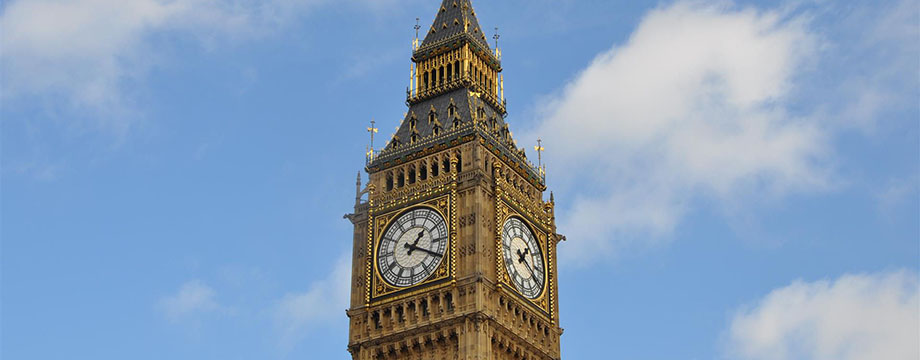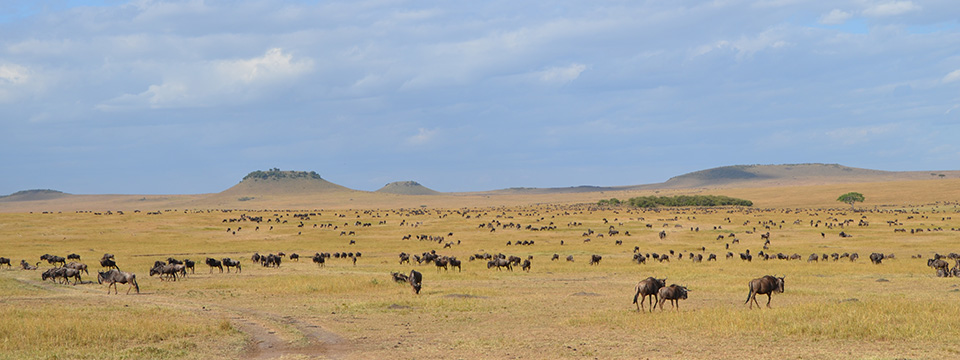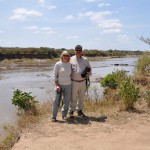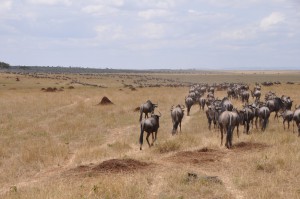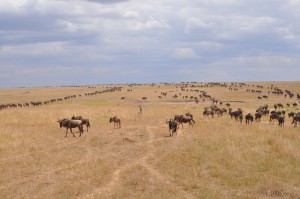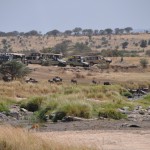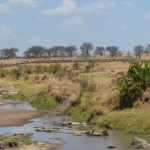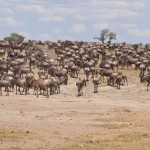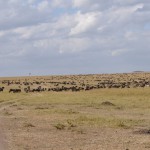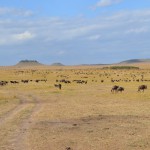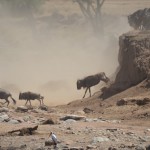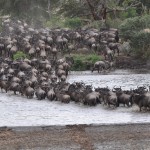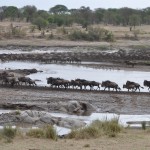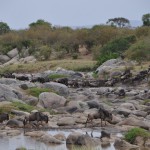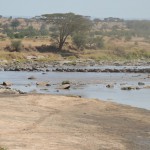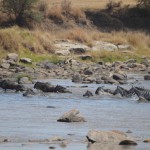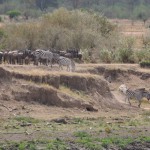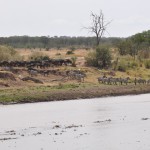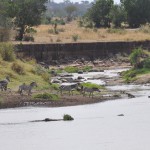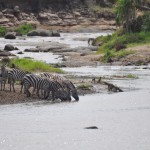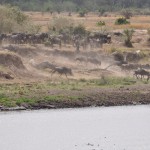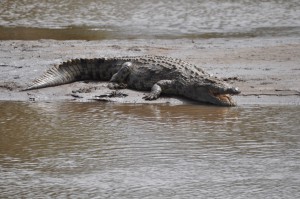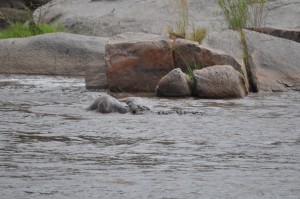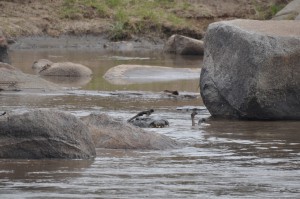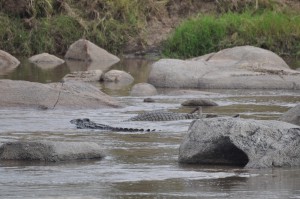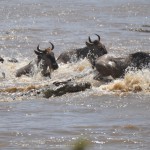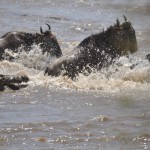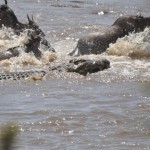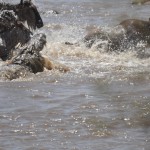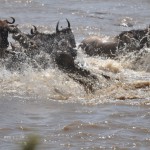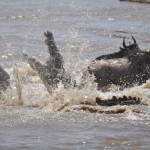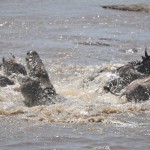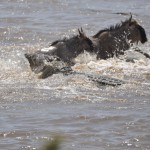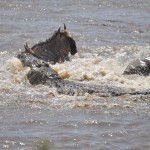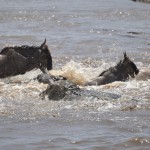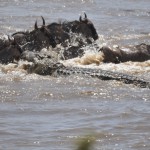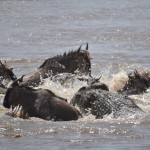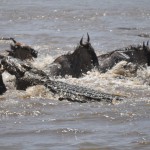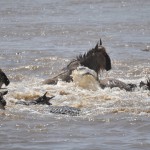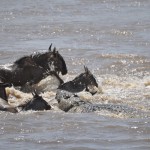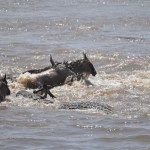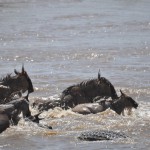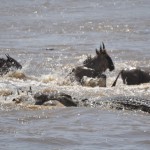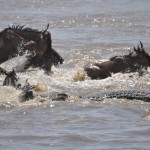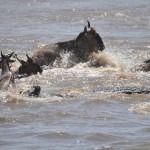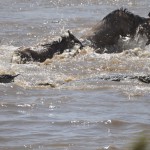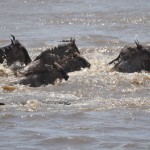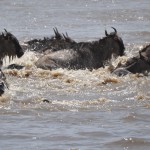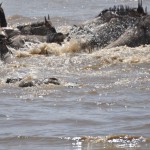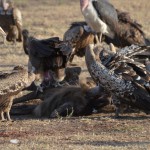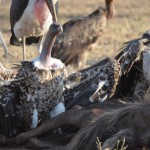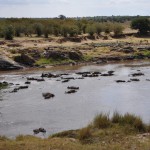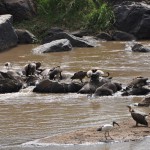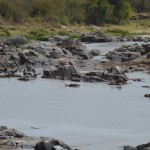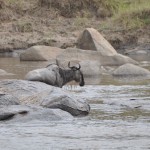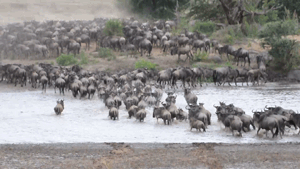Our adventure to The Serengeti was timed to coincide with The Great Migration. Our four days on the Serengeti provided more than enough opportunity to witness this bucket list worthy spectacle of nature first hand.
The migration consists of 1.7 million wildebeest who wander in a large circular region throughout Kenya and Tanzania, following seasonal availability of grazing and water. The migration has various interwoven parts. There are the wildebeest themselves who get it all started. Then there are the zebras who travel along with the wildebeest as companions, along with gazelles, antelopes and impalas. Then there are the predators. The crocodiles lie in wait in the rivers, waiting for a meal to cross. Following the large migrating herds are the large cats and hyenas, right on their heels, picking off the young, old and weak stragglers. Lastly comes the cleanup crew, the vultures. Oh, and I forgot to mention the humans. Dozens of Land Cruisers, loaded with tourists and their cameras, lining the riverbanks watching the spectacle unfold as it has for thousands of years. At times it’s almost comical, but at least the wildebeest do put on a good show.
We are located on the northern Serengeti in Tanzania, near the Mara River. We are just a few kilometers from the man made border of the Maasai Mara in Kenya. Wildebeest are everywhere. EVERYWHERE. There are thousands of them located a few hundred yards outside our camp. You can hear them mooing and bellowing all day and night. As we game drive around the bush each day in our Land Cruiser, wildebeest are in ample supply. This is how the great plains in America must have looked 200 years ago. Then the bison herds stretched from horizon to horizon, just as these wildebeest do today.
My first impression was, wow, there are so many. My second impression was, wow, they are dumber than cows. If you’ve grown up on a farm or spent much time around cows, you realize that bar is really low, and to be dumber than a cow, is pretty dumb indeed.
The wildebeest are nature’s lemmings. They blindly follow one another, even over a cliff. The wildebeest will mass along the edge of the river or embankment. The ones at the rear just keep going and eventually push one into the water or over the edge. Once the first one goes, the rest follow. Sitting along the river and watching this all play out is quite amusing.
If the wildebeest are thirsty, they will approach the river but won’t drink. They have to wait for the zebras. The zebras are smart. They keep a lookout for crocodiles or other predators. They talk to each other with their high pitched squeals. Once they determine the water is safe, they will all approach and drink. When the wildebeest see this, then that is their cue to drink too. Except they are too stupid. The first wildebeest approaches where the zebras are and just as they dip their heads to drink, the wildebeest behind them crowd up and push them into the river. Once one lands in the river, he starts running to the other side. All the rest of the wildebeest see this and take off running too to the other side of the river. 20 minutes later, a few thousand wildebeest have crossed over to the other side and still not a single one of them got a drink of water. Then it plays out again, this time coming back across the river 100 yards away.
The fun part starts when the crocodiles show up. We approached one crossing just as the wildebeest started across. 5-6 large crocodiles started swimming for the heard. When I say large crocodile, I mean large. The things are easily over 20ft long each. They swim directly into the heard and start blindly snapping away at everything that moves. One crocodile got lucky and snagged in his jaws a 500-600lb wildebeest by the torso. The wildebeest struggled mightily against the jaws clamped down around its body. The crocodile immediately started swimming sway from the herd with its prize. The wildebeest continued to struggle, kick and flail for several more seconds before finally going limp.
At that point several of the other crocodile started after this one with the wildebeest. They were hoping to take its prize away. We watched for several minutes as the crocodile with the dead wildebeest swam in circles and in a zigzag pattern, trying to play “keep away” from the other crocodiles.Eventually the other crocodiles gave up on the chase.
The following day, we were lying in wait near the river when a large herd of wildebeest approached. A large crocodile was swimming around out in the middle of the river. This should be fun. And it was. Well for us, not so much for the wildebeest.
The wildebeest herd started the stampede across the river. The large crocodile approached the herd and leaped out of the water. Its huge open jaws came crashing down on a large wildebeest. The wildebeest flailed and kicked and managed to break free and keep running. The crocodile turned and repeated this process several more times, indiscriminately snapping at each passing wildebeest. In the end that crocodile appeared to snag a small baby wildebeest and drag it under the water.
We approach another section of the Mara River and the stench of death is in the air. As we come out of the grassland and see the river before us, we see hundreds of vultures. They are scavenging the carcasses of several dozen dead wildebeest. Crocodile are not the only dangers in the water when crossing a river. A wildebeest can easily slip on a rock and be crushed by the masses of other wildebeest coming up behind them. They can easily drown, be trampled, break a leg, or just be too old, slow or frail. Numerous perils can befall them. These more treacherous crossing locations can take their toll on the wildebeest as we saw here.
We saw a lone straggling wildebeest cross the river several minutes after all the others had passed. He had a distinct limp in his rear leg. I thought he would be easy prey for the crocodiles in the river, but none of them seemed to notice him. He struggled to get across, falling several times along the way, panting heavily, resting in the middle of the river. He looked cold, wet, scared, old. He eventually he made it to the other side. He stopped on the other bank and rested for a bit. Then he struggled up the embankment and started out after the rest of the herd. I’m sure he has made this journey many times over the years, but this would most certainly be his last.
On the last night in the Serengeti, we were in our tent. Kathy was sleeping soundly and I was awoken by the sound of lions roaring. Actually, I heard them every single night, but this night they were really close by. I could also hear the wildebeest “mooing” loudly. There was a large commotion just outside. Camp rules state you may not leave your tent at night under no circumstances. You could be eaten and that’s bad for business. Hey, some rules are NOT meant to broken. So once the sun came up and we were allowed out and about the camp, I asked about all the commotion overnight. Apparently some lions killed a wildebeest right outside tent #12. How cool is that?
